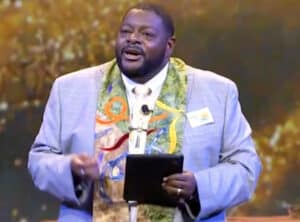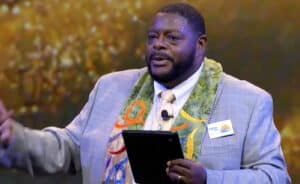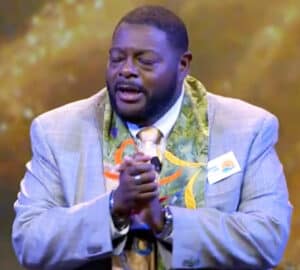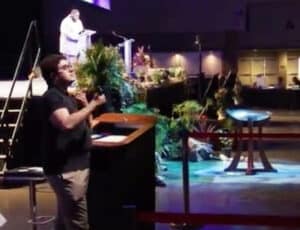Doyle’s Opening Sermon at General Synod Fills Attendees with Power of Hope

The United Church of Christ’s 34th General Synod opened Friday, June 30, in Indianapolis with worship, and key to the service was the sermon delivered by Jamar Doyle, president and CEO of the UCC Council for Health and Human Service Ministries.
In keeping with the theme of General Synod, “Making All Things New,” based on Isaiah 43:18-19, Doyle’s sermon centered on the ability of our lives and communities to be transformed by stepping out in faith.
“This Synod is about transformation,” said Doyle, “the transformation of lives through the inspiration of the Holy Spirit that in turn transforms our ministries into beacons of hope in a suffering world.”
But just as the Israelites in Isaiah 43 had forgotten they are God’s people, so, too, said Doyle, has that happened in “many of our own church and ministries … Life has beaten us down to the point that we simply exist from day to day … God seems distant, perhaps not even present.”
The answer, said Doyle, is in the transformational process of making things new. Step one, he said, is reflecting on the past. “Just as God reminded the people of Israel of their past deliverances, we, too, should honor and celebrate the faithfulness of God in our lives and in the United Church of Christ,” Doyle said.
He cited UCC forebears at the front of countless struggles: those who marched during the Civil Rights Movement, advocating for racial equality and justice; those who championed women’s rights in ministry and the workplace; and those who have and who continue to advocate for LGBTQ+ rights, “embracing the belief that God’s love is for all, regardless of sexual orientation or gender identity.”
“Although our church is not perfect, and there is much work to be done, we can generally say that in the face of social and cultural challenges, the United Church of Christ has boldly proclaimed the gospel message of justice, inclusivity, and love,” he said. “Through the United Church of Christ’s history, we have seen the transformative power of God’s love in action through our ministries.”
But, Doyle continued, then “God says, ‘Forget all that … I am about to do something new.’ … ’God, you’ve brought me a long way,’” and God says, ‘You ain’t seen nothing yet!’”

While our faith is strengthened by what God has done for us in the past, we are not called to live in the past, Doyle added. Step two in our transformational journey is releasing the burdens of the past to embrace God’s new work.
We are called to remember the past, said Doyle, but not live in it: “We visit, but it’s not a destination.”
Doyle then focused on church traditions, and those in attendance nodded in affirmation and with laughter at the adage heard time and time again in local churches, “It’s how we do things.” He described an online discussion about church traditions in which the most popular answer included practices, rituals, and beliefs passed down through generations. One poster remarked, “So, tradition is basically listening to the instructions of dead people.”
Doyle paused, then asked those in the plenary hall, “Can we really be surprised we have dying churches and ministries if we continually follow the instructions of dead people?”
“And please understand: dead people are not limited to those who have gone before us,” he added. “In our lives and ministries, we have the walking dead among us, people who participate in church activities, attend services, and even serve others, but who are spiritually depleted because they lack an intentional connection with the source of life, Christ Jesus.”
Such depletion can happen over time and often isn’t intentional, said Doyle — caused by the weight of day-to-day living and responsibilities. Traditions become dangerous when we are overwhelmed by the demands on life, and use these traditions to turn on autopilot, to simply go through the motions, he added.
“Our faith goes on autopilot without any depth of a meaningful relationship,” he said. “We become Cruise Control Christians.”
Instead, Doyle continued, “our traditions should serve as a vehicle to the divine, not the means to place our faith on autopilot. The classic response to a new idea — ‘We can’t because this is how we’ve always done it’ — … is the autopilot response of a Cruise Control Christian.
“For our traditions to serve as vehicle to the divine, they should be understood as dynamic expressions of faith that can adapt and evolve while staying rooted in core principles and values that are continuously re-evaluated in light of their Biblical foundations and inspired by the Holy Spirit.”
We must let go of the familiar and get comfortable with “holy discomfort,” Doyle said, which leads to step three in the transformational journey, to take action with faith.

Citing God reminding the Israelites that God would successfully bring them across the desert and out of bondage, Doyle said, “Listen, sometimes the very thing you’ve been praying for is already waiting for you. It’s just on the other side of your desert. All that’s required is faith that God will provide water for your journey. But often we are too fearful or too comfortable to even take that first step … out into the unknown.”
Doyle called on church leaders to show their faith by having the courage to step out. “You say, ‘How can we even consider the new at a time of shrinking congregations and tightening ministry budgets?’ I ask this question, ‘Can you afford not to?’
“Are churches shrinking because there are less needs in our communities? Or are many churches and ministries simply no longer meeting the needs of people in their community, preaching only to familiar faces Sunday after Sunday after Sunday?”
“Perhaps the current situation many churches find themselves in is a wake-up call to discern what new thing God is looking for us to do in our ministries, what to let go of, and when and how to take action,” he added.
The need for outreach is greater than ever, Doyle said. “There is someone waiting for the new ministry God has already placed within you right now, because our society is a burning desert for many people who have been blatantly told that they are less than. People are living in exile every day right under our noses, and most of us turn a blind eye, or offer private support.”
But step three means taking a stand publicly, he said. “It’s going into the desert and putting your comfort at risk. It’s going right back into the desert after you’ve been watered to offer water to someone else.”
Remember, said Doyle, “the desert is God’s creation, too, so it’s not a place to fear, but a place where faith is strengthened, and a place where we in Christ can be that water to those who are struggling.”
CHHSM agencies do this every day, said Doyle. “These agencies — your agencies, ministries of the UCC — provide over $1 billion in uncompensated charitable care to more than 3 million clients annually, nationwide,” he added. “These are your ministries. It is hard to do direct service, especially right now, so they need your love and support.”
Doyle lifted up the health and human services work of UCC local churches, associations, and conferences, too. He encouraged them to find more ways to work together, “to join CHHSM in holy discomfort” and transforming communities.
To close his sermon, Doyle offered a litany of hope using the metaphor of water.
“If you are struggling with how to be a more welcoming and inclusive community, step out in faith because the water is coming.

“If you’re the lone voice in the room advocating for those silenced by oppression, keep advocating even if you stand alone, and know that the water is coming.
“If you’ve been told you don’t belong simply because of who you are, know that you are valued and have a place in Christ who promises to never leave or forsake you, despite what others may say, so yes, the water is coming. …
“If you feel as though you are on autopilot, numb to both joy and pain as you simply go through the motions waiting for God to move in your life and ministry, God is moving even if you don’t see it; yes the water is coming.
“If you find yourself in a liminal space, struggling to know your next step, know that God has a plan for your life and ministry so the water is coming.”
“God is doing something new, breaking chains, launching ministries, and changing lives, and all you have to do to be part of God’s movement is to make room for the transformative power of the God with an open heart,” Doyle concluded, “ready to let go of what was so that you can receive the blessing of what’s new.”
Join Our Mailing LIst
"*" indicates required fields
Follow on Facebook
Pension Boards appoints David A. Klassen as its President, CEO - United Church of Christ
www.ucc.org
The Pension Boards, an affiliated ministry of the United Church of Christ recently announced its appointment of David A. Klassen as its next President and